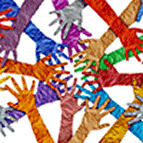|
If you have ever questioned what to call a racial or ethnic group
or individual, the viewpoints included here may be helpful in broadening
your understanding. Most often it is best to refer to individuals by their given names.
However if a group identity is necessary, racial and ethnic group
names used by the national news media, census reports, civil rights
organizations and leaders are usually widely acceptable.
Two major rules should NOT be overlooked.
Names and labels are often a communication barrier. Work to eliminate
this barrier. Local viewpoints about name changes for some American
peoples are presented below:
The term Hispanic was bureaucratized in 1968 by President Johnson
when he formally delcared the week of September 15 as National
Hispanic Heritage Week. Prior to this time, people from the
Spanish-speaking world were identified as Spanish, because of
the language or by country of origin.
The U.S. government, for
economic and political reasons, found it necessary to use one
term to describe a group of people whose commonality across
the group was language. Most of us picked up the use of the
term Hispanic when, in English, we were referring to the whole
group. However, in Spanish, we referred to ourselves as Latinos.
The terms translated became interchangeable.
Some individuals of the Spanish-speaking group origin found
an opportunity to politicize on the basis of what they wished
to be called. My personal reasons for choosing to be identified
as Latina are as follows:
- The correct translation of the term Latino is Latin, not
Hispanic.
- The term Hispanic identifies origin from the peninsula
Hispanola, which is Spain and Portugal, as opposed to South
and Central America and the islands where the majority of
the Latinos come from. Although we have roots in Spain,
we have other roots that cannot be denied, rejected or forgotten.
- The term Latino more descriptively portrays us as opposed
to Caucasian European which Hispanic denotes.
- Hispanic is a bureaucratic term, imposed on a group of
people, by a government that is not sensitive to our issues,
concerns or needs.
Although the term Latino is not used by all people of Spanish-speaking
origin, it is more frequently being used by many.
Ampara
Ocasio
American people
of African descent have labeled themselves with various names.
Negro and Colored, although initially given to them by others,
later became what they called themselves. Negro, from a Spanish
word, meant black, and colored originated in the southern United
States with Jim Crow.
Negro and colored were discarded with the arrival of the
Black Power period of the late 1960s. Black people decided
that they wanted to be called Afro-Americans. Afro-American
eventually became Black.
Black has been the accepted label for almost two decades.
Now American black people appear to be moving toward a new
label, African-American, emphasizing culture and geographical
origins rather than physical characteristics. African-American
is also consistent with other references to race and ethnic
identity in America, as for example, Italian American and
Asian American.
Elbert English
Since recorded time
by the Europeans in our (the New) World, the ORIGINAL PEOPLE
were called "savage Red Skins" for defending our Mother Earth
and the People. We always refer to ourselves by our family,
clan and tribe. Was it our fault Christopher Columbus got lost,
thinking he was on the shores of India, and labeled us INDIANS?
The Federal government has kept track of the Indians through
the offices of the Bureau of Indian Affairs for the past one
hundred and fifty years.
Now, since the 1960s, the ORIGINAL PEOPLE are conscientiously
known as NATIVE AMERICANS. For seventy times seven generations,
we have been, and still are, the PEOPLE.
Marcia Steele
|

